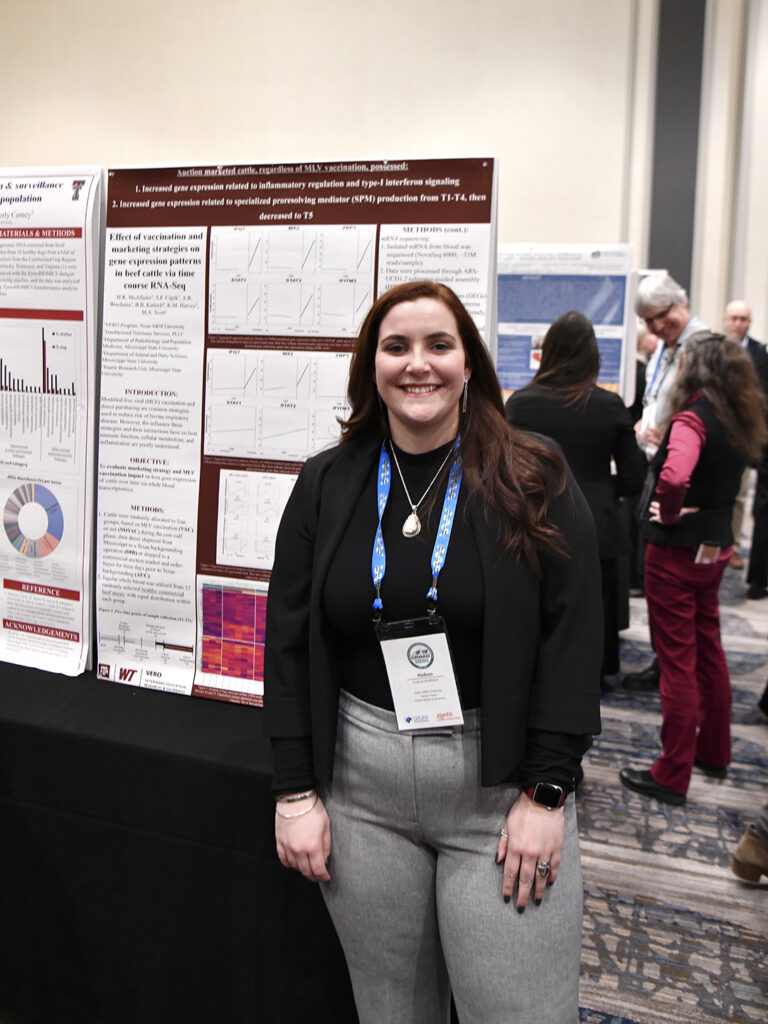Texas A&M VERO Student Tackles Bovine Respiratory Disease In Beef Cattle
Story by Courtney Price, VMBS Communications

Bovine Respiratory Disease (BRD) is the most economically important disease of beef cattle in the United States, costing the industry around $1 billion each year in production loss and treatment costs. Affecting both calves and adult cattle, BRD can be difficult to detect and treat before it impacts other cattle in a herd.
Faculty, staff, and students at the Texas A&M School of Veterinary Medicine & Biomedical Sciences’ (VMBS) Veterinary Education, Research, & Outreach (VERO) program are tackling BRD head-on using cutting-edge technology and new research that studies the complete life cycle of cattle.
“Nearly 20% of all cattle will need treatment for BRD at some point in their life,” said Hudson McAllister, a second-year Ph.D. student at VERO. “BRD is an umbrella term for several related diseases of the respiratory system and can affect several biological systems of cattle.”
McAllister is part of a team that received a multi-year United States Department of Agriculture (USDA) grant in partnership with Mississippi State University to study the complete life cycles of beef cattle to better understand the effects of BRD.
“Because of how the industry works, with cattle moving locations frequently, it can be hard to get data for complete life cycles,” McAllister said. “With these new data, we can look at everything from vaccination status to how cattle are transported to see how these aspects of the industry might influence BRD throughout the course of their lives.”
Prior to joining the VERO program for her doctorate, McAllister got her bachelor’s degree in animal science at the University of Tennessee at Martin, followed by a master’s degree in the same field from West Texas A&M University (WT). There, while working with WT faculty member Dr. John Richeson, she was introduced to VERO’s Drs. Paul Morley and Matthew Scott, who encouraged her to join the VMBS program.
“McAllister’s background in animal science has really prepared her to understand why her research projects really matter,” Scott said. “Working with Richeson at WT has helped give her that ready-to-learn attitude that’s so valuable to have in the VERO program.”
The combination of classroom lectures and hands-on-experience offered at VERO will help students like McAllister become key players in the future of veterinary medicine.
“I’m hoping to do pharmaceutical regulatory work after I graduate,” McAllister said. “Vaccines are my primary area of interest. That’s why I work on BRD — I want to encourage more herd owners to use them, and I want to help providers make them more effective.”
Animal medicine regulatory programs are essential for keeping veterinary clinics stocked with safe and effective medications, like vaccines that can help prevent BRD.
“We’ve done a great deal of work with different kinds of vaccines to see how they play into the prevention of BRD,” McAllister said. “However, we still need to better understand the pathogenesis — the way the whole disease complex develops — so we can make more effective vaccines.”
It’s thanks to the supportive community at VERO that students like McAllister can find such tremendous success.
“VERO is my happy medium,” she said. “I knew I wanted to be a part of the veterinary community, but I didn’t want to practice medicine. That’s why I chose this program, so I could get exposure to both worlds.”
VERO is a unique program because it provides graduate students from both the VMBS and WT with ample research opportunities right in the heart of the Texas cattle industry. Students can also build close relationships with faculty mentors to improve their chances of landing the perfect job after graduation.
“We’re a very tight-knit community of students and faculty working together,” McAllister said. “If I have questions or I’m having problems with something in the lab, there’s always someone to help.”
###
For more information about the Texas A&M College of Veterinary Medicine & Biomedical Sciences, please visit our website at vetmed.tamu.edu or join us on Facebook, Instagram, and Twitter.
Contact Information: Jennifer Gauntt, Director of VMBS Communications, Texas A&M College of Veterinary Medicine & Biomedical Sciences, jgauntt@cvm.tamu.edu, 979-862-4216


